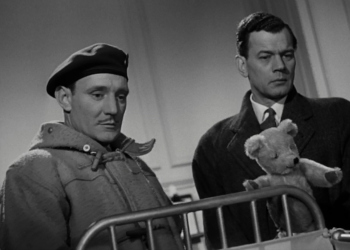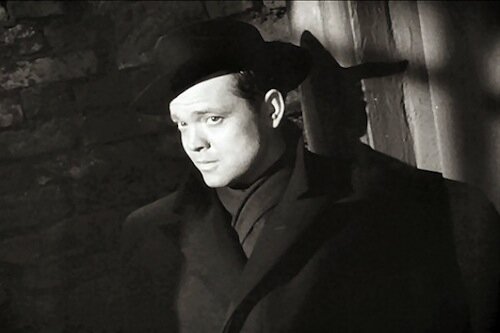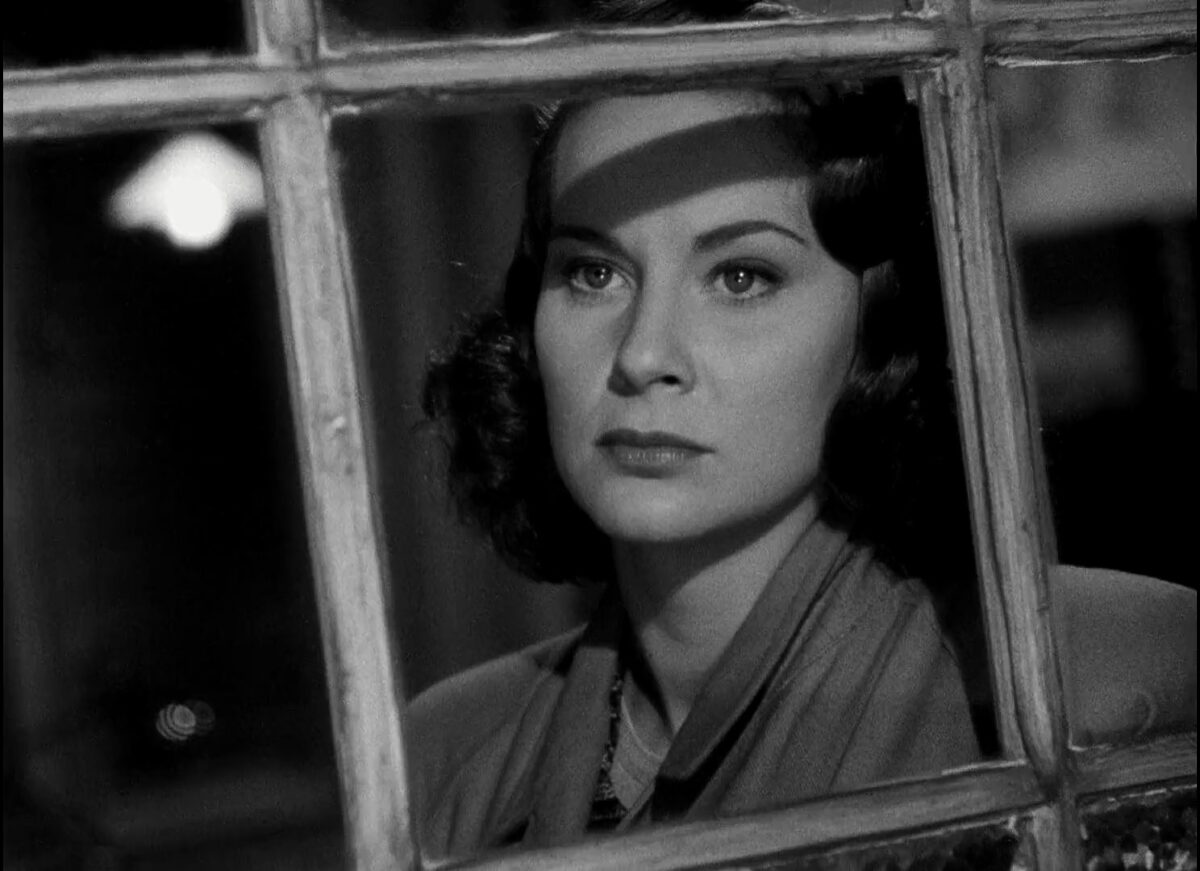It would make a much better story, but I can’t remember the first time I saw The Third Man. I was in my teens, and it felt as if Carol Reed’s stark, moody, oddly claustrophobic thriller had been made especially for me: screenplay by Graham Greene, a tale of tragic love, a beautiful, sad-eyed female lead. The dialogue was sharp and both weighty and witty, echoing off the iconic battered moonscape of post-war Vienna.
The Third Man was showing again recently at the British Film Institute on the South Bank. I gleefully booked a ticket, partly because I love BFI, partly because I still thrill at the experience of the cinema, but mainly because I can never watch The Third Man often enough. I booked at the last minute when friends had made plans, so I went alone, which I never mind. The lights lowered and we were off to Vienna again.
“I never knew the old Vienna, before the war…”
This article does contain spoilers
When I first saw The Third Man I knew I’d enjoy it, but I didn’t quite predict that I would be so overwhelmingly rapt that for nearly two hours I would hardly draw breath. Orson Welles is, of course, dazzling as Harry Lime, while Joseph Cotten is his everyman counterpart, as he was in Citizen Kane and, to an extent, The Magnificent Ambersons. The narrative thread is maintained, both on screen and in voiceover, by Trevor Howard’s dour, dutiful but ultimately humane Major Calloway, a military policeman working for the four-power government of the conquered city. Howard had burst to stardom in 1945 as Alec, one of the star-crossed lovers in David Lean’s brilliant Brief Encounter, and he deployed the same calm, suppressed emotion for Reed in this film.
I don’t need to describe the plot of the film, and, actually, it is relatively simple, though you can become lost in a maze if you don’t pay close attention to the discussions of the accident that “killed” Harry Lime, who was present, how many people, and what exactly took place. Greene’s magnificent tale is not one of labyrinthine texture, but essentially a morality play, or at least a moral conundrum: how do we react if we find out that an old friend is not only not what we thought but also something much darker and more sinister? How are we to assimilate these different depictions of someone we love?
Did we really not know? Did Harry’s friend, the novelist Holly Martins, really not know what Lime was like? I’m not so sure. When Calloway first confronts him with the fact that Lime was a racketeer, tangled in the unsavoury black market, Martins, by then drunk on the whisky Calloway is buying him, doesn’t at first seem shocked to his core.
“Some petty racket with gasoline or something,” Martins snorts dismissively. After all, isn’t that Vienna in those straitened times? As Baron Kurtz later tells him, when he is found playing the violin in a café, “So, you have found out my little secret. A man must live.”
“It wasn’t petrol,” Calloway tells him quietly.
“So it wasn’t petrol. So it was tyres, or saccharine. Why don’t you catch some murderers for a change?”

Martins is shocked by the revelation that Lime has been selling watered-down penicillin, and that this has devastated the children’s ward of the local hospital; shocked, but surprised? Certainly Martins ends the film disillusioned, but his journey to that realisation has been a gentle decline (despite his ferris wheel ride) rather than the horrifying plummet off a cliff.
Welles allows this to be real, to be true, by his astonishing performance as Lime. He doesn’t appear until halfway through the film, hiding in a doorway, shown in what has to be one of the best reveals in cinema. The camera holds his face for just a second or too longer than is comfortable, and it gives you just a moment to size up the physicality of the man you’ve heard so much about. There is a smile twitching at the corners of his mouth, and almost to the end Lime has the look of a man who knows something no-one else has yet realised. It is only in the last moments, as the dying Lime’s fingers thrust through the grating into the fresh air, that he realises there is nothing else, no escape, no secret dodge. Life has cheated him, as he had cheated life. All of this, and you realise afterwards that Welles is on screen for perhaps 10 minutes in all.
Back in the BFI this time around, I don’t know if I was in a strange mood, or if it was a sudden but random realisation, or if something unlocked a part of my brain that had been closed until then, but as I watched, as I absorbed all over again the relationship between Martins and Anna, and Anna’s reminiscences of her relationship with Harry, I came to a realisation. I don’t know if it’s profound or not, and perhaps others have had the same thought before, but it tipped over my conception of the shape, the moral tenor of the film, and gave me a completely new perspective.
The “third man” of the title is, of course, not the star. Indeed, it is almost a McGuffin, a plot device which has no inherent meaning. “There was a third man—he didn’t give evidence,” reveals the porter in Lime’s building shortly before he is murdered. But Martins gives the game away halfway through, as he resolves to leave Vienna.
“I don’t care whether Harry was murdered by Kurtz or Popescu, or a third man.”
Lime is not the star either, despite the power and legend of Welles’s performance. He drives the story in absentia—he is what connects all the characters to each other—but he is a presence, and it is only Welles who lifts him to more than that, makes him compelling, underlining everything else that happens.

Yet it is not Martins, either. The writer of cowboy stories is a likeable force, human, and therefore a mass of contradictions. He is easily swayed, but feels emotions with great force for as long as he has them. He can be foolish, romantic, stubborn, disheartened: he can be anything because there is a sense in which he is all of us, anywhere. He tries to do the right thing, sometimes for the right reason, and can eventually be persuaded to see where his best interests lie. Joseph Cotten portrays him as the man who acts as we hope (or suspect) we would act like in the same circumstances.
Anna Schmidt is the heart of the film. Harry’s girlfriend, an actress at the Josefstadt Theatre, she is numbed by grief at Harry’s “death”, then harrowed all over again when his survival is revealed and then he dies a second death. And she harbours a secret: she was born in Czechoslovakia, information, which if revealed to the authorities, will allow the Russians to claim her. In 1949, nothing more needed to be said than that. Her desperation to remain in the British-controlled sector of Vienna does not require explanation.
Alida Valli, who plays Anna and was credited simply as ‘Valli’, had been a huge star of Italian cinema before and during the Second World War. Multilingual with good English, she maintained success after the war ended, starring opposite Gregory Peck in Hitchcock’s The Paradine Case (1947) and then in Frank Sinatra’s first non-musical film, The Miracle of the Bells (1948). Benito Mussolini, of all people, had hailed her as “the most beautiful woman in the world”, and in The Third Man you can see his point. Although Vienna is drab and shattered, and she is often in a dowdy raincoat, she is luminous, and every ounce of emotion is visible on her face.
The emotion is deep and affecting, and it is unremittingly bleak. When Martins, at this point believing Harry to be dead, reassures Anna that she will fall in love again, she is fierce, almost angry with him.
“Can’t you see I don’t want to. I don’t ever want to.”
Her despair is more profound than that. When Martins first introduces himself, backstage at the Josefstadt, they talk about Harry and the effect of his loss. Anna’s manner is light, casual, but grief has already consumed her and there is little left.
“I don’t know anything any more,” she reflects calmly, “except that I want to be dead too.”
Her tone is so mild that you wonder at first if she is joking, at least blackly, but it becomes clear that she means it. Anna’s life has been emptied, voided, and now all she wants is for it to come to an end.
This is what I realised. For Anna, there is no hope. Everything has gone, and there will be no happy ending. It is striking that the conclusion of the film — when Martins turns back on his way to the airport to be with Anna but, silently, heart-breakingly, she walks past without even looking at him — diverges from Greene’s novella, which implies that Martins and Anna begin a new life together. There is no such redemption in the film, Carol Reed refusing to end on a note he found artificially happy. Although Greene and producer David O. Selznick initially pressed for the upbeat conclusion, the novelist later admitted, “One of the very few major disputes between Carol Reed and myself concerned the ending, and he has been proved triumphantly right”.
Anna Schmidt is the heart of the film because she is truly, literally hopeless. She is the dark nature we all have, the crushing pessimism, the depression we try to fend off, and she is, in a way, Vienna too, crushed by events, battered and misused by life, but without any promise of redemption. And there is no redemption, no reversal of fortune, because that is the way of things in life. Often there are no happy endings, and while a cinema-going public might have wanted one in 1949, they would have found that a story which ended bleakly struck a doleful chord in their hearts. It would have adequately reflected, too, just how much suffering had come before. The old world was gone and would not return, just like Harry: making one’s peace with that was her greatest task, but, the film tells us, don’t expect it to be easy.
I find The Third Man a sadder film now than I did. Whether a sinner or a saint, Harry ends the film dead. Anna is alive, contrary to her preference, and will go on, no doubt, eking out her scanty living and staying half a step ahead of the Russians, but she sees existence, not life. And Martins, in the closing seconds of the film, gambles everything, places all his emotional life on red, and, without a turn of Anna’s head, he loses. “I’m just a hack writer who drinks too much and falls in love with girls,” he admits to Anna during their acquaintance, and that is how he ends the film. No girl, and his best friend dishonoured and dead.
Somehow I find Anna’s presence at the centre of the film satisfying. She is much more interesting than Martins and even than Lime, deeper and more richly textured. And when you look at her story, her narrative arc, she seems the most real. She teaches us the cost of war in achingly human detail, and the price that must sometimes be paid for love. Finally, she teaches us one more fundamental lesson: sometimes death is not the highest price. Sometimes it is worse to go on living. Perhaps not a slogan to boost a film on its posters, but the distillation of a very real human experience.

